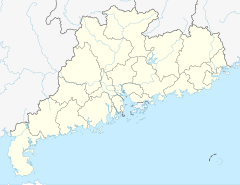| Nengren Temple | |
|---|---|
| 能仁寺 | |
 The paifang at Nengren Temple. The paifang at Nengren Temple. | |
| Religion | |
| Affiliation | Buddhism |
| Deity | Chan Buddhism |
| Leadership | Yaozhi (耀智) |
| Location | |
| Location | Mount Baiyun, Baiyun District, Guangzhou, Guangdong |
| Country | China |
  | |
| Geographic coordinates | 23°10′29″N 113°18′24″E / 23.174859°N 113.306671°E / 23.174859; 113.306671 |
| Architecture | |
| Style | Chinese architecture |
| Founder | Yinjian (吟坚) |
| Date established | 1824 |
Nengren Temple (Chinese: 能仁寺; pinyin: Néngrén Sì) is a Buddhist temple located on Mount Baiyun, in Baiyun District of Guangzhou, Guangdong, China.
History

Nengren temple was first established by Yinjian (吟坚) in 1824, during the reign of Daoguang Emperor (1821–1850) of the Qing dynasty (1644–1911). The buildings of Nengren Temple that still remain were being restored and preserved until in 1908, when the temple had reached unprecedented heyday and became the largest Buddhist temple on Mount Baiyun.
On May 17, 1924, Sun Yat-sen and his wife Song Qingling visited Nengren Temple.
In 1966, a Japanese youth delegation came to Nengren Temple to plant a group of Cinnamomum camphora named "China-Japan Youth Friendship Forest".
In 1993, the Guangzhou Municipal Government has allocated CN¥15 million (US$ 2.383 million) for the reconstruction project. Then Nengren Temple was officially reopened to the public in May 1995.
Architecture
Nengren Temple is built along the up and down of mountains. Now the existing main buildings include the Paifang, Shanmen, Mahavira Hall, Ciyun Hall (慈云殿), Kṣitigarbha Hall, Sanmodi (三摩地), Wuchendi (无尘地), Sixth Patriarch Hall, Baoyue Pavilion (宝月阁), Guru Hall, Drum Tower, Bell Tower, Dining Hall, Reception Hall, etc.
References
- 广东白云山能仁寺隆重举行耀智法师晋院仪式. fjnet.com (in Chinese). 2012-05-25.
- ^ 昔日白云山十三寺 而今仅存能仁寺 [Mount Baiyun had 13 temples in the past, and now only has Nengren Temple]. iFeng (in Chinese). 2012-06-11.
- 能仁寺即日起无需门票(图) [No tickets are needed in Nengren Temple now onwards]. 163.com (in Chinese). 2012-05-25.